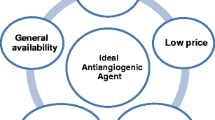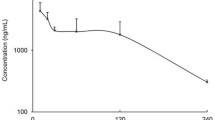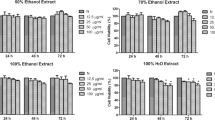Abstract
The development of pharmacological antiangiogenic agents to disrupt the vascular supply and starve tumours of nutrients and oxygen is a novel strategy for tumour therapy. Chinese cordyceps, a traditional Chinese herb, has been widely reported to exhibit antitumor effects. In the present study, we tested the suppression of tumour angiogenesis by Chinese cordyceps extract (CCE) via a tube formation assay using human umbilical vascular endothelial cells (HUVECs) in vitro and Lewis lung carcinoma xenografts in mice. In addition, CCE was investigated in an ex vivo angiogenesis assay using rat aortic rings. CCE showed a dose-dependent suppression of capillary tube formation in HUVECs as well as in rat aortic rings. The antiangiogenic activity of CCE was further verified in Lewis lung carcinoma xenograft models in mice, where the tumour volume was significantly decreased after treatment with CCE at 100 mg/kg. The mean vascular density (MVD) in the tumours, as measured by immunohistochemical staining of platelet endothelial cell adhesion molecule-1 (CD31), was also markedly reduced by treatment with CCE at 100 mg/kg. These results indicated that Chinese cordyceps may exhibit antitumor effects through antiangiogenic activity and could be used in the prevention and/or therapy of angiogenesis-related cancers.

Graphical Abstract






Similar content being viewed by others
Data availability
Data sharing is not applicable to this article, as no datasets were generated or analysed during the current study.
References
Asmitananda T, Ren H, Zhang HY, Yang T, Chen TJ, Chen MW (2011) Pro-apoptotic effects of Paecilomyces hepiali, a Cordyceps sinensis extract on human lung adenocarcinoma A549 cells in vitro. J Cancer Res Ther 7(4):421–426
Baharara J, Namvar F, Ramezani T, Hosseini N, Mohamad R (2014) Green synthesis of silver nanoparticles using Achillea biebersteinii flower extract and its anti-angiogenic properties in the rat aortic ring model. Molecules 19(4):4624–4634
Bellacen K, Lewis EC (2009) Aortic ring assay. J Vis Exp 24(33):1564–1565. https://doi.org/10.3791/1564
Bhat TA, Singh RP (2008) Tumor angiogenesis – a potential target in cancer chemoprevention. Food Chem Toxicol 46(4):1334–1345
Cai HW, Li J, Gu BH, Xiao Y, Chen RS, Liu XY, Xie XM, Cao L (2018) Extracts of Cordyceps sinensis inhibit breast cancer cell metastasis via down-regulation of metastasis-related cytokines expression. J Ethnopharmacol 214:106–112
Chang YS, Yuan Y, Zhang Q, Rong Y, Yang Y, Chi M, Liu Z, Zhang YM, Yu P, Teng YO (2020) Effects of an isatin derivative on tumor cell migration and angiogenesis. RSC Adv 10:1191–1197
Chiu CP, Hwang TL, Chan Y, El-Shazly M, Wu TY, Lo IW, Hsu YM, Lai KH, Hou MF, Yuan SS, Chang FR, Wu YC (2016) Research and development of Cordyceps in Taiwan. Food Science Human Wellness 5(4):177–185
Chu E (2004) Bevacizumab targeted therapy: validation of angiogenesis as a key target for advanced colorectal cancer. Clin Colorectal Canc 4(1):16
Ernens I, Lenoir B, Devaux Y, Wagner DR (2015) Rat aortic ring model to assay angiogenesis ex vivo. Bio-protocol 5(20):1622
Gao JJ, Xue X, Gao ZH, Cui SX, Cheng YN, Xu WF, Tang W, Qu XJ (2011) LYP, a bestatin dimethylaminoethyl ester, inhibited cancer angiogenesis both in vitro and in vivo. Microvasc Res 82(2):122–130
Huo XW, Liu CQ, Bai XL, Li WJ, Li J, Hu XF, Cao L (2017) Aqueous extract of Cordyceps sinensis potentiates the antitumor effect of DDP and attenuates therapy-associated toxicity in non-small cell lung cancer via IκBα/NFκB and AKT/MMP2/MMP9 pathways. RSC Adv 7(60):37743–37754
Ji NF, Yao LS, Li Y, He W, Yi KS, Huang M (2011) Polysaccharide of Cordyceps sinensis enhances cisplatin cytotoxicity in non-small cell lung cancer H157 cell line. Integr Cancer Ther 10(4):359–367
Jordan JL, Nowak A, Lee TD (2010) Activation of innate immunity to reduce lung metastases in breast cancer. Cancer Immunol Immunother 59(5):789–797
Li J, Cai HW, Sun HH, Qu JB, Zhao B, Hu XF, Li WJ, Qian ZM, Yu X, Kang FH, Wang WX, Zou ZX, Gu BH, Xu KP (2020) Extracts of Cordyceps sinensis inhibit breast cancer growth through promoting M1 macrophage polarization via NF-κB pathway activation. J Ethnopharmacol 260:112969. https://doi.org/10.1016/j.jep.2020.112969
Marme D (2018) Tumor angiogenesis: a key target for cancer therapy. Oncol Res Treat 41(4):164
Mei YX, Yang W, Zhu PX, Peng N, Zhu H, Liang YX (2014) Isolation, characterization, and antitumor activity of a novel heteroglycan from cultured mycelia of Cordyceps sinensis. Planta Med 80(13):1107–1112
Nakamura K, Shinozuka K, Yoshikawa N (2015) Anticancer and antimetastatic effects of cordycepin, an active component of Cordyceps sinensis. J Pharmacol Sci 127(1):53–56
Niwa Y, Matsuura H, Murakami M, Sato J, Hirai K, Sumi H (2013) Evidence that naturopathic therapy including Cordyceps sinensis prolongs survival of patients with hepatocellular carcinoma. Integr Cancer Ther 12(1):50–68
Pang X, Yi Z, Zhang X, Sung B, Qu W, Lian X, Aggarwal BB, Liu M (2009) Acetyl-11-keto-beta-boswellic acid inhibits prostate tumor growth by suppressing vascular endothelial growth factor receptor 2-mediated angiogenesis. Cancer Res 69(14):5893–5900
Qi WC, Zhou XT, Wang JQ, Zhang K, Zhou YJ, Chen SP, Nie SP, Xie MY (2020) Cordyceps sinensis polysaccharide inhibits colon cancer cells growth by inducing apoptosis and autophagy flux blockage via mTOR signaling. Carbohydr Polym 237:Article 116113
Queen NJ, Deng H, Huang W, Mo XK, Wilkins RK, Zhu T, Wu XY, Cao L (2021) Environmental enrichment mitigates age-related metabolic decline and lewis lung carcinoma growth in aged female mice. Cancer Prev Res (Phila) 14(12):1075–1088
Ramjiawan RR, Griffioen AW, Duda DG (2017) Anti-angiogenesis for cancer revisited: is there a role for combinations with immunotherapy? Angiogenesis 20(2):185–204
Rhee YH, Jeong SJ, Lee HJ, Lee HJ, Koh W, Jung JH, Kim SH, Sung-Hoon K (2012) Inhibition of STAT3 signaling and induction of SHP1 mediate antiangiogenic and antitumor activities of ergosterol peroxide in U266 multiple myeloma cells. BMC Cancer 12:28. https://doi.org/10.1186/1471-2407-12-28
Ruma IM, Putranto EW, Kondo E, Watanabe R, Saito K, Inoue Y, Yamamoto K, Nakata S, Kaihata M, Murata H, Sakaguchi M (2014) Extract of Cordyceps militaris inhibits angiogenesis and suppresses tumor growth of human malignant melanoma cells. Int J Oncol 45(1):209–218
Shin WS, Maeng YS, Jung JW, Min JK, Kwon YG, Lee ST (2008) Soluble PTK7 inhibits tube formation, migration, and invasion of endothelial cells and angiogenesis. Biochem Bioph Res Co 371(4):793–798
Virman J, Bono P, Luukkaala T, Sunela K, Kujala P, Kellokumpu-Lehtinen PL (2015) VEGFR3 and CD31 as prognostic factors in renal cell cancer. Anticancer Res 35(2):921–927
Wang J, Nie S, Cui SW, Wang Z, Phillips AO, Phillips GO, Li Y, Xie M (2017) Structural characterization and immunostimulatory activity of a glucan from natural Cordyceps sinensis. Food Hydrocolloid 67:139–147
Wang MT, Zeng Q, Li Y, Imani S, Xie D, Li YH, Han YW, Fan J (2020) Bevacizumab combined with apatinib enhances antitumor and anti-angiogenesis effects in a lung cancer model in vitro and in vivo. J Drug Target 28(9):961–969
Wu F, Song H, Zhang Y, Zhang Y, Mu Q, Jiang M, Wang F, Zhang W, Li L, Li H, Wang Y, Zhang M, Li S, Yang L, Meng Y, Tang D (2015) Irisin induces angiogenesis in human umbilical vein endothelial cells in vitro and in zebrafish embryos in vivo via activation of the ERK signaling pathway. Plos One 10(8):e0134662
Xiao JH, Qi Y, Xiong Q (2013) Nucleosides, a valuable chemical marker for quality control in traditional Chinese medicine Cordyceps. Recent Pat Biotechnol 7(2):153–166
Yadav L, Puri N, Rastogi V, Satpute P, Sharma V (2015) Tumour angiogenesis and angiogenic inhibitors: a review. J Clin Diagn Res 9(6):XE01–XE05
Yakes FM, Chen J, Tan J, Yamaguchi K, Shi Y, Yu P, Qian F, Chu F, Bentzien F, Cancilla B, Orf J, You A, Laird AD, Engst S, Lee L, Lesch J, Chou YC, Joly AH (2011) Cabozantinib (XL184), a novel MET and VEGFR2 inhibitor, simultaneously suppresses metastasis, angiogenesis, and tumor growth. Mol Cancer Ther 10(12):2298–2308
Yang J, Zhang W, Shi P, Chen J, Han X, Wang Y (2005) Effects of exopolysaccharide fraction (EPSF) from a cultivated Cordyceps sinensis fungus on c-Myc, c-Fos, and VEGF expression in B16 melanoma-bearing mice. Pathol Res Pract 201(11):745–750
Yoshikawa N, Nakamura K, Yamaguchi Y, Kagota S, Shinozuka K, Kunitomo M (2007) Reinforcement of antitumor effect of Cordyceps sinensis by 2'-deoxycoformycin, an adenosine deaminase inhibitor. In Vivo 21(2):291–295
Zhang W, Yang J, Chen J, Hou Y, Han X (2005) Immunomodulatory and antitumour effects of an exopolysaccharide fraction from cultivated Cordyceps sinensis (Chinese caterpillar fungus) on tumour-bearing mice. Biotechnol Appl Bioc 42(1):9–15
Zhao Y, Adjei AA (2015) Targeting angiogenesis in cancer therapy: moving beyond vascular endothelial growth factor. Oncologist 20(6):660–673
Acknowledgements
We thank Xiaomei Jiang for her technical assistance and helpful discussion.
Funding
This research was jointly supported by the National Key R&D Program of China (2018YFC1706101) and the Dongguan Academician Workstation Project (DGYSZ-2018-03).
Author information
Authors and Affiliations
Contributions
Wenjia Li, Jiangchun Wei and Xingzhong Liu designed the experiments. Wenjia Li carried out the experiments. Jing Li, Xuefeng Hu, Linghua Xu and Xiaoyu Liu performed data collection and analysis. Yimin Zhang prepared the research materials. Zhengming Qian and Liling Jin helped with the literature search and manuscript preparation. Wenjia Li drafted the manuscript, and Jiangchun Wei and Xingzhong Liu corrected and edited the manuscript. All authors read and approved the final manuscript.
Corresponding authors
Ethics declarations
Ethics approval
The protocols for animal experiments were approved by the local Institutional Animal Care and Use Committee (IACUC) of HEC Company, Dongguan, Guangdong, China. The accreditation number is IAEC -K-200720-03.
Conflict of interest
The authors declare no competing interests.
Additional information
Section Editor: Tanay Bose
Publisher’s note
Springer Nature remains neutral with regard to jurisdictional claims in published maps and institutional affiliations.
Rights and permissions
Springer Nature or its licensor holds exclusive rights to this article under a publishing agreement with the author(s) or other rightsholder(s); author self-archiving of the accepted manuscript version of this article is solely governed by the terms of such publishing agreement and applicable law.
About this article
Cite this article
Li, W., Li, J., Hu, X. et al. Tumour suppression by Chinese cordyceps extract via antiangiogenic activity. Mycol Progress 21, 76 (2022). https://doi.org/10.1007/s11557-022-01821-0
Received:
Revised:
Accepted:
Published:
DOI: https://doi.org/10.1007/s11557-022-01821-0




